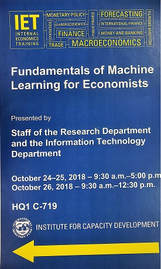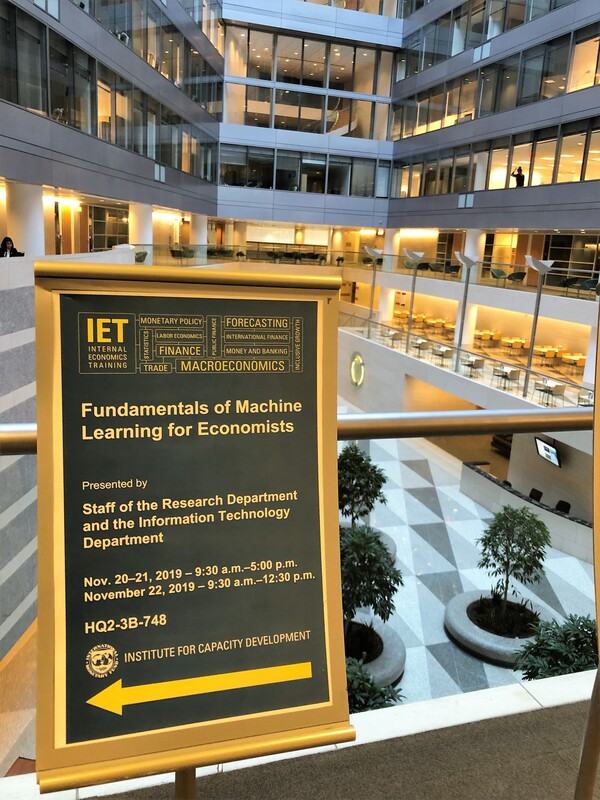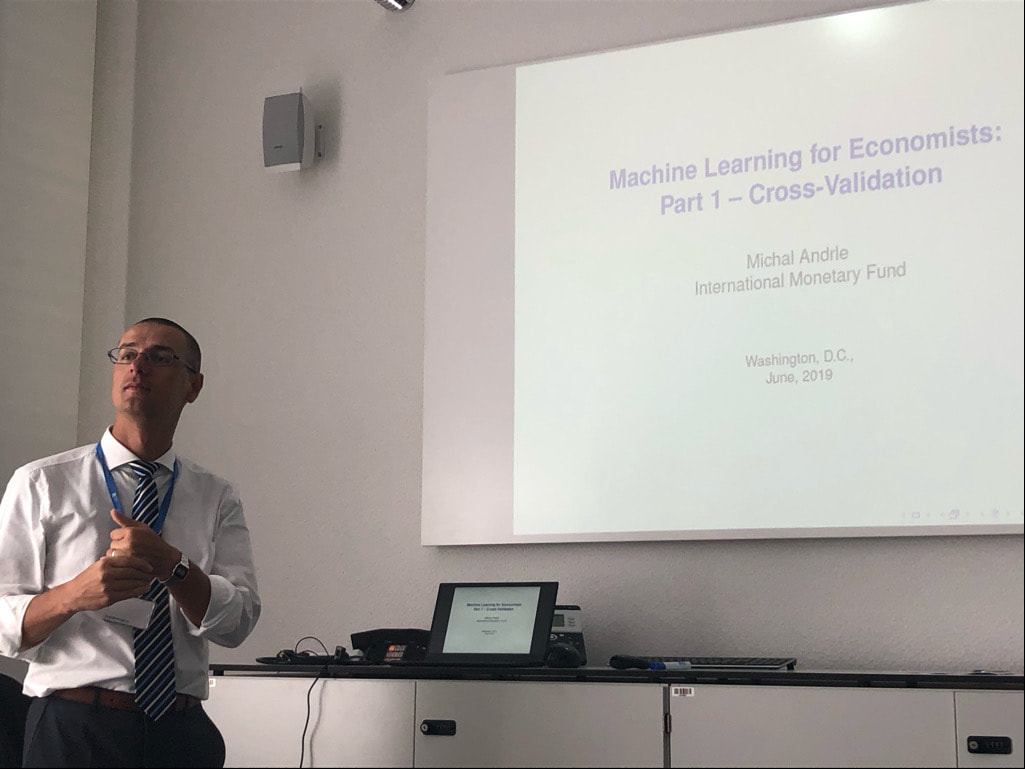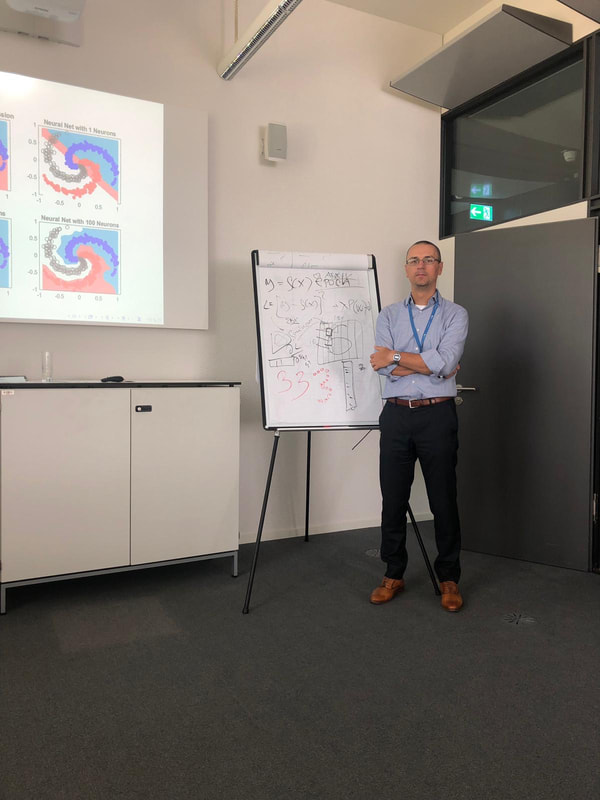"When I was young, I would rather give a lecture on mathematics than listen to one.
Now that I am older and more mature I would rather give TWO lectures on mathematics than listen to one.”
R.H. Bing
Now that I am older and more mature I would rather give TWO lectures on mathematics than listen to one.”
R.H. Bing
Fundamentals of Machine Learning for Economists
The slides and links are an introduction of the key principles of machine (statistical) learning. This is a project for learning and having fun.
The materials are created from a perspective of an economist and with the audience of economists in mind, focusing on similarities with and differences from the practice of econometrics. Since the evolution of the field is very fast and the adoption of many principles of ML in econometrics is gearing up, the course is mainly about principles rather than a bag of tools...
"Machine Learning" methods are becoming mainstream tools for applied economic forecasting and for causal inference and policy evaluation.
(A) FUNDAMENTALS OF MACHINE LEARNING FOR ECONOMISTS: PREDICTION AND CAUSAL INFERENCE
These are some materials from a course that Aquiles Farias, Alin Mirestean, and I gave at the IMF in October 2018. Thanks to their kind invitation, the course was also organized at the European Investment Bank (EIB) in Luxembourg and at the OECD in Paris in June and July of 2019. The most recent version of the course is from November 2019.
Basic Principles:
More on Methods:
(B) Machine Learning for CAUSAL and POST-SELECTION INFERENCE and POLICY EVALUATION:
Other Topics:
Download:
The materials are created from a perspective of an economist and with the audience of economists in mind, focusing on similarities with and differences from the practice of econometrics. Since the evolution of the field is very fast and the adoption of many principles of ML in econometrics is gearing up, the course is mainly about principles rather than a bag of tools...
"Machine Learning" methods are becoming mainstream tools for applied economic forecasting and for causal inference and policy evaluation.
(A) FUNDAMENTALS OF MACHINE LEARNING FOR ECONOMISTS: PREDICTION AND CAUSAL INFERENCE
These are some materials from a course that Aquiles Farias, Alin Mirestean, and I gave at the IMF in October 2018. Thanks to their kind invitation, the course was also organized at the European Investment Bank (EIB) in Luxembourg and at the OECD in Paris in June and July of 2019. The most recent version of the course is from November 2019.
Basic Principles:
- Introduction [pdf] -- key terms, overview, and principles
- Loss Functions [pdf] -- evaluating regression and classification problems (confusion matrix, ROC curves, cross-entropy)
- Learning, Over-fitting, and Regularization [pdf] -- overfitting, regularization as a life style
- Validation and Cross-Validation [pdf] -- cross-validation of IID and non-IID data (time series)
- Intro to Ensemble Methods [pdf] -- bagging, stacking, and boosting
- Curse of Dimensionality [pdf]
More on Methods:
- LASSO, Elastic Net, Ridge Regression, Bayesian Models [pdf]
- Classification and Regression Trees, Random Forests [pdf] (Aquiles)
- Random Forests [pdf] (Aquiles)
- Nearest-Neighbor Methods [pdf] (Alin)
- Crash Course on Neural Networks [pdf]-- Part ONE, Part TWO
(B) Machine Learning for CAUSAL and POST-SELECTION INFERENCE and POLICY EVALUATION:
- Causal and Post-Selection Inference -- an Introduction [pdf]
(causality vs. statistics, post-selection inference, sample splitting, honest inference, double/orthogonal machine learning, post-Lasso,...)
Other Topics:
- Feature Engineering [pdf]
- Classification with Unbalanced Samples [pdf]
Download:
|
In October 2018 with my awesome IMF colleagues Alin Mirestean and Aquiles Farias we organized the first internal IMF's course on "Fundamentals of Machine Learning for Economists". Fundamental course should allow external experts lecturing mostly on advanced topics in their domain...
Some of the materials on this website have been used in the course together with an extensive hands-on examples and the associated coursework. For the time being this website posts only lecture notes I was responsible. With permission I will post Alin's and Aquiles' materials alongside with my versions. Please, see disclaimers below and in the slides. |
What participants are saying...
Based on the Nov 20-22 2019 internal IMF course (with some selection bias ;)
- This is a great course! Big thanks to all the developers and speakers! Overall well-balanced in terms of theory and practical examples.
- Content, length, pace, admin arrangements were all good.
- This was the best course I have taken in the Fund, and probably the most useful. They did an amazing job at balancing depth and breadth of the material and providing hands-on exercises. All three speakers were very clear in their exposition and able to convey the complex topics in a very pedagogical way.
- Michal is a phenomenon. Amazing as a teacher and knows EVERYTHING.
- Lecturers are amazing. Very knowledgeable and able to present a very difficult topic in a digestible manner. I am very happy that I had a chance to attend this course. I feel that I will be able to talk about the topic with more confidence and understand some of the literature.
- This was one of the best in-house courses (if not the best one) that I have attended so far in my time at the Fund.
- Maybe cover less material. Hands on examples are great.
- ...
Disclaimer:
This is my private site.
The views expressed herein are those of the author and should not be attributed to the International Monetary Fund,
its Executive Board, or its management.





